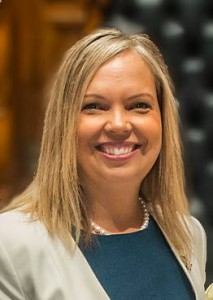Photo: Facebook Page of Coralee Oakes
VICTORIA–British Columbians will cast their ballots in municipal elections every four years, instead of every three years as is currently the case, if a law proposed by the provincial government is passed.
Coralee Oakes, the minister of community, sport and cultural development, announced Tuesday that she’ll introduce legislation during the current sitting of the legislature to add an extra year to the terms of municipalities, regional districts, park and school boards, as well as the Islands Trust.
She said the proposal is the most significant change to local government elections in 20 years and will bring B.C. in line with other provinces.
The reform would take effect this November, Oakes said, even though some politicians are concerned it may dissuade people in smaller communities from running.
“The reason why provinces across Canada have moved to four years is that it provides greater certainty in communities to move those very important projects forward _ things such as infrastructure improvements. It provides opportunities for local government officials to understand their projects and carry them through.”
The proposal was among more than two dozen made in 2010 by a joint task force representing the provincial government and the Union of B.C. Municipalities.
Oakes said her ministry is also looking at ways to strengthen the oath of office so local governments and administrators have the tools to deal with problem politicians. Staff are also studying feedback on municipal-election spending limits, she said.
Last year, the UBCM passed a resolution backing the four-year term, and Oakes’ ministry said the BC School Trustees Association also supports the change.
Mayor Dean Fortin of Victoria said the province’s larger municipalities have been pushing for the four-year term. He said many municipal issues have become more complex and the extra year gives local governments more time to plan and engage the community.
“It will allow for better governance, it will allow for greater efficiency and greater accountability,” he said.
Mayor Josie Osborne of Tofino, on the west coast of Vancouver Island, said she has mixed feelings about the four-year term but is generally supportive of the change.
She said councils that are “working well together” would have more time to get things done.
However, the longer term may be an impediment to some people _ especially young people _ who are considering running for municipal office.
“It’s really important to me that more younger people step up and decide to run and get involved in municipal politics, and I hope that this won’t dissuade them from trying,” she said.
Selina Robinson, the New Democrat MLA for Coquitlam-Maillardville and the party’s local-government critic, said she has some questions about how the changes will play out and how they could impact provincial elections.
She said some current MLAs shifted from municipal to provincial politics during last May’s provincial election. Of those, some immediately resigned their seats on municipal councils and others were paid for both roles, she said.
Robinson said she wants to see how many municipal council seats remain empty because of the reforms.
